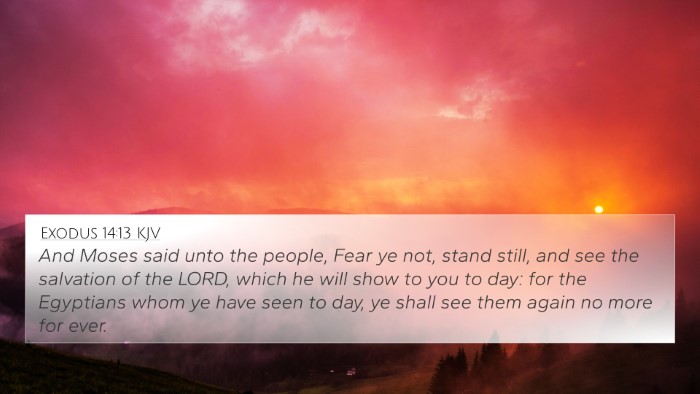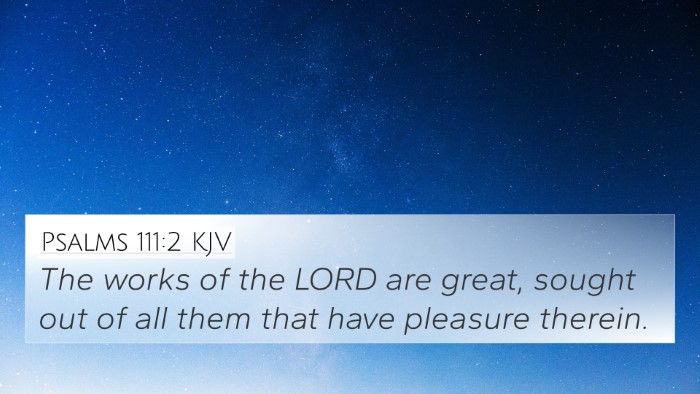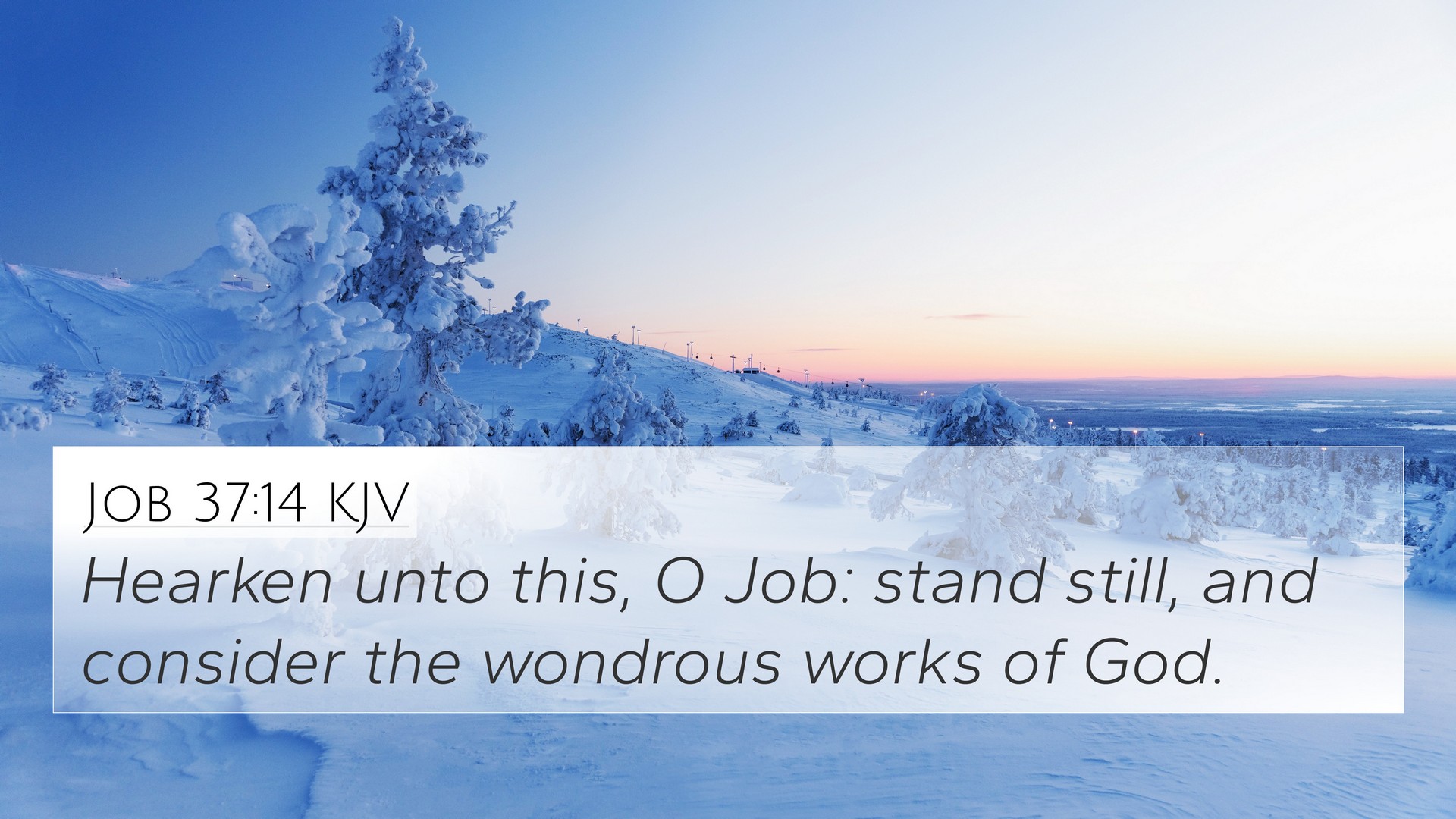Old Testament
Genesis Exodus Leviticus Numbers Deuteronomy Joshua Judges Ruth 1 Samuel 2 Samuel 1 Kings 2 Kings 1 Chronicles 2 Chronicles Ezra Nehemiah Esther Job Psalms Proverbs Ecclesiastes Song of Solomon Isaiah Jeremiah Lamentations Ezekiel Daniel Hosea Joel Amos Obadiah Jonah Micah Nahum Habakkuk Zephaniah Haggai Zechariah MalachiJob 37:14 Similar Verses
Job 37:14 Cross References
Hearken unto this, O Job: stand still, and consider the wondrous works of God.
Uncover the Rich Themes and Topics of This Bible Verse
Listed below are the Bible themes associated with Job 37:14. We invite you to explore each theme to gain deeper insights into the Scriptures.
Job 37:14 Cross Reference Verses
This section features a detailed cross-reference designed to enrich your understanding of the Scriptures. Below, you will find carefully selected verses that echo the themes and teachings related to Job 37:14 KJV. Click on any image to explore detailed analyses of related Bible verses and uncover deeper theological insights.

Exodus 14:13 (KJV) »
And Moses said unto the people, Fear ye not, stand still, and see the salvation of the LORD, which he will show to you to day: for the Egyptians whom ye have seen to day, ye shall see them again no more for ever.

Psalms 111:2 (KJV) »
The works of the LORD are great, sought out of all them that have pleasure therein.

Habakkuk 2:20 (KJV) »
But the LORD is in his holy temple: let all the earth keep silence before him.

Psalms 46:10 (KJV) »
Be still, and know that I am God: I will be exalted among the heathen, I will be exalted in the earth.
Job 37:14 Verse Analysis and Similar Verses
Understanding Job 37:14
Job 37:14 states: "Hearken unto this, O Job: stand still, and consider the wondrous works of God." This verse invites Job to pause and reflect on God's majesty, particularly in the context of the natural world. Below is a combined interpretation derived from public domain commentaries by Matthew Henry, Albert Barnes, and Adam Clarke, shedding light on the significance of this verse.
Verse Context
Job 37 is part of a broader discourse where Elihu addresses Job, emphasizing God's power, wisdom, and the mysteries of creation. Elihu, presenting a more tempered understanding than Job's other friends, encourages Job to recognize the divine workings in nature as evidence of God's greatness.
Key Themes
- The Sovereignty of God: The verse highlights God's ultimate authority over creation, suggesting that recognizing this sovereignty can lead to a deeper understanding of His works.
- Human Reflection: Elihu urges Job to "stand still"—a call for introspection and awe at God’s marvelous creations. This reflects the biblical principle that human beings are encouraged to meditate on divine works.
- Nature as a Teacher: The invitation to observe nature implies that creation speaks volumes about its Creator, a theme echoed throughout Scripture.
Connections Between Bible Verses
In studying Job 37:14, one can draw connections with several key verses that elaborate on the themes present:
- Psalm 19:1-4: "The heavens declare the glory of God; and the firmament shows his handiwork." This psalm parallels the call to observe and reflect on the works of God.
- Isaiah 40:26: "Lift up your eyes on high, and behold who hath created these things..." It echoes the sentiment of recognizing God’s power through His creations.
- Romans 1:20: "For the invisible things of him from the creation of the world are clearly seen..." This New Testament perspective reaffirms the idea that God’s attributes are evident in the world around us.
- Job 12:7-9: "But ask now the beasts, and they shall teach thee; and the fowls of the air, and they shall tell thee..." Here, Job himself is reminded of the instructive power of nature.
- Proverbs 6:6: "Go to the ant, thou sluggard; consider her ways, and be wise." This highlights the same theme of learning from creation.
- Psalms 104:24-25: "O Lord, how manifold are thy works! In wisdom hast thou made them all..." This reflects the wonder of God's creations, inviting further contemplation.
- Acts 14:17: "Nevertheless he left not himself without witness, in that he did good, and gave us rain from heaven, and fruitful seasons..." This continues the theme of God’s goodness evident in nature.
The Meaning of “Stand Still”
The phrase "stand still" conveys a powerful command for stillness and contemplation. Matthew Henry notes that in moments of turmoil, God's faithful ones are called to pause and reflect rather than rush to conclusions or actions based on misunderstanding. Albert Barnes comments that such stillness allows for a clearer perception of God's providence and will, which often transcends human understanding.
Conclusion
Job 37:14 serves as a profound reminder of the need for humility and reflection in the face of life's uncertainties. It encourages believers to recognize and appreciate God's handiwork in creation, fostering a deeper relationship with Him through contemplation and understanding. The interconnections with other Scripture enrich this passage, providing a broader context for its interpretation and applicability in Christian faith and life.
Further Analysis and Study Tools
For those interested in exploring similar themes and understanding the connections between Biblical texts, various tools can aid in Bible cross-referencing:
- Bible Concordance: A valuable resource for finding specific topics and verses across the scriptures.
- Cross-Reference Bible Study Guides: Guides that help to highlight thematic connections across different books of the Bible.
- Comprehensive Bible Cross-Reference Materials: Collections that provide extensive insights into how verses relate and support one another throughout both the Old and New Testaments.
Incorporate Cross-Referencing in Your Study
To maximize your understanding, consider the following methods:
- Identify connections between Old and New Testament writings to grasp the narrative of salvation and God's character.
- Use Bible cross-reference systems to see how different scriptures illuminate similar themes, such as God's power and creation.
- Explore Bible verses related to specific themes, like suffering or divine justice, by looking up passages that are cross-referenced.
Job 37:14 stands as a testament to the beauty of contemplating God's works, inviting both personal reflection and a deeper engagement with His Word.






